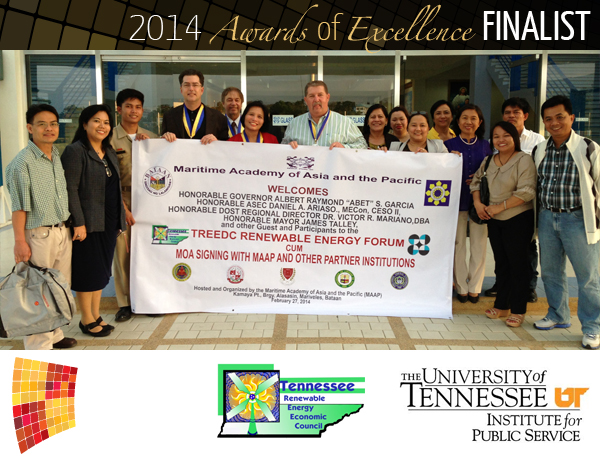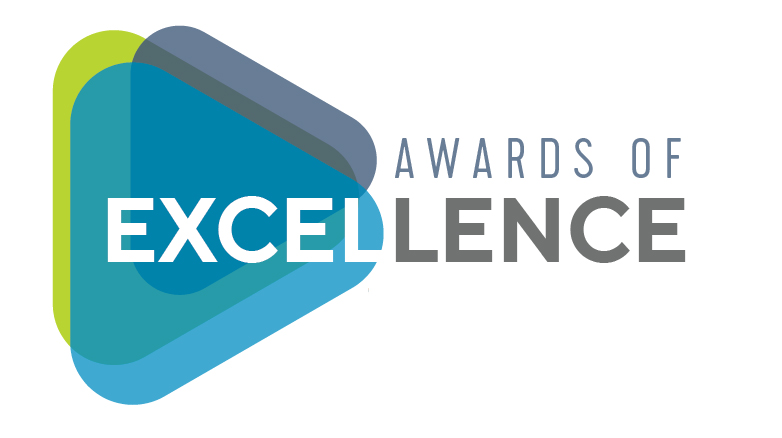Network

| Award Category: | Leadership and Collaboration |
| Project Site: | TREEDC – International Exchange Program |
| Submitted By: | University of Tennessee Institue for Public Service |
| Contact: | Warren Nevad , 865.974.9839 |
Case Study
Abstract
The University of Tennessee Institute for Public Service ( IPS) created the Tennessee Renewable Energy & Economic Development Council (TREEDC) in 2008 to help connect renewable energy initiatives with economic development opportunities for communities . TREEDC started with 4 rural cities scattered across the state. TREEDC has grown into an international organization with 96 mayors and 30 Universities that collaborate together to create a path to fast track renewable energy worldwide. The TREEDC International Exchange Program expands the scope of TREEDC’s mission of connecting renewable energy with economic development.
The International Exchange Program was created in 2012 to help cultivate technology and informational exchange among TREEDC’s members with international counterparts. The major objectives are information and technology exchange between sister cities and colleges, showcase Tennessee technology providers , promote social responsibility, and to replicate the TREEDC model worldwide. Five (5) countries were selected and the Philippines was chosen as the Pilot Country for Tennessee to connect to the rest of the world in advancing renewable energy. Today, there are 8 Philippine cities and 12 universities that have enrolled into the Program. This initiative has produced 5 educational forums across the country, provided typhoon relief assistance and has facilitated solar development, waste to energy and pico-hydro development in the rural areas of the country. The University has generated more positive recognition worldwide as an innovator in outreach and Tennessee renewable energy businesses have secured new customers in the Philippines. This has become a win-win for all parties involved.
Problem/Background
The need for the TREEDC International exchange program was evident after we researched the energy profile of the Philippines. This country was one of our 5 selected countries joining Kenya, Germany, India and Peru to serve as the foundation of the International Exchange Program. The Philippines were chosen as a pilot for the program based on a number of factors. The nation has very high energy cost at more than 25 cents per kilowatt of power which suggests a need for new energy sources. Many of the rural areas of the country are not connected to the power grid. The country also suffers from large blackouts. (http://www.census.gov.ph/tags/energy-consumption). These blackouts sometimes last for up to 8 hours. (http://world.time.com/2013/08/06/no-end-in-sight-to-the-energy-crisis-that-plagues-the-philippines) . The Philippines Department of Energy estimates that energy demand will increase approximately 6 % between 2014 and 2010.
Overall, the Philippines is considered a developing country with a vast amount of resources available for renewable energy including biofuels and solar potential. The nation’s government recognizes this and recently passed a renewable energy law that allows for the renewable energy sector to grow even more quickly. The government also views this measure as a way to combat the negative aspects of climate change. Having reliable renewable energy would help the nation bounce back from typhoons and other natural catastrophes more quickly. This lessens the pressure of having to build “conventional” power plants and expensive infrastructure. These factors provide an atmosphere friendly to renewable energy. For TREEDC, this program opens the door to benefit Tennessee’s and the Philippines’ businesses, schools, universities and cities.
The Philippines could be considered a world leader in renewable energy, with 30 percent of its power generation being powered by the renewable energy sector. The Philippines is the world’s second largest generator of geothermal energy and was the first Southeast Asian nation to invest in large-scale solar and wind technologies. The Renewable Energy Law of 2008 offers attractive feed in tariffs for Tennessee businesses to benefit since the feed in tariffs have decreased significantly in Tennessee. The Philippines also has high unemployment levels and renewable energy can be a tool to help bring more jobs and learning opportunities for students.
Promotion and support of renewable energy in the country was intensified with the passing of the Renewable Energy Act of 2008 which made a feed-in-tariff and a renewable portfolio standard.
Solution
The solution to the Philippines’ high energy costs and lack of accessibility starts with educational awareness and technical assistance. One of the primary mechanisms for this is the hosting of forums for renewable energy at universities. The universities play major roles as anchor institutions in their regions. Forums forward this impact by engaging the communities they serve and connect businesses and universities. Forums also engage students who have an interest in renewable energy. This allows them to get involved in their own communities. This also helps spread the ideas and techniques of renewable energy to the next generation of technological and political leaders. These connections give rise to sister institutions for Tennessee organizations in the Philippines that become valuable assets. TREEDC also provides technical assistance to its Philippine members in the same manner with our Tennessee members.
This international exchange program also serves as a vehicle to enable rural areas access to reliable power where they are not able to access the power grid. An extreme case of this is during emergencies that knock out what there is of the power grid. This was the case after Typhoon Yolanda. TREEDC worked with Vis Solis, a Tennessee company that develops solar power systems, along with the Renewable Energy Association of the Philippines to provide affected areas with solar charging light and radio units. In these rural areas that are not connected to the power grid, these units help in emergencies and are useful for a long time.
One of the strongest potentials for renewable energy in the Philippines is the use of bioenergy. Bioenergy includes municipal wastes, green wastes (woodchips for example), and compost that can be converted into power. One of the methods is gasification. This has had success in Covington, TN and can be successfully applied in other areas including the Philippines. Gasification is a clean way to generate power using a fuel source that would otherwise be wasted and simply thrown out into a dump. TREEDC is currently involved in providing technical assistance to a 3 MW Waste to energy Facility in the Bicol area, TREEDC is also assisting with the development of several small solar arrays in the rural areas in the Philippines.
Results
The most significant impact of the project so far has been reaching over 800 attendees of the different energy conferences throughout the Philippines while recruiting 8 cities and 12 colleges in the Philippines to support the efforts of TREEDC and expand Tennessee’s global reach. These connections are important in expanding knowledge and abilities to a nation so rich in renewable energy potential. These cities and universities are in addition to Tennessee’s 96 cities and 30 universities, including Tennessee Tech and the University of Tennessee, involved in TREEDC. This provides a solid base for further expansion and idea sharing. TREEDC also has hired an International Affairs Director who is a retired TVA official to carry out our follow-up activities on a daily basis in the Philippines. This is a volunteer position who works out of the TREEDC office in Mabalacat.
TREEDC, the Renewable Energy Association of the Philippines and Vis Solis also provided assistance by procuring 200 portable solar lighting and battery charging stations for typhoon victims in the Philippines. These units also include radios that help with relief efforts. The City of Puerto Princesa will complete a rooftop solar project with TREEDC member Vis Solis on November 12, 2014.
Future Considerations
Future plans include hosting an International Renewable Energy Conference at Tennessee Tech University in October. Approximately a dozen Philippine University Presidents, representatives and mayors will be visiting our Tennessee renewable energy facilities and meeting with their counterparts in the United States. The goals of the Philippines program include to enroll at least 25 Cities and 30 Universities across the Philippines; facilitate the development of at least 10 solar projects in the Philippines; develop 3 or more Biomass to energy plants in various locals in the Philippines; develop several campus renewable energy development parks; create internship opportunities and provide tuition assistance; and explore connecting other Southeastern Asian Countries or targeting another developing country and reaching out to their stakeholders.
The International Exchange Program and organizations similar to TREEDC can be replicated in other States willing to build relationships with businesses, schools, and international counterparts. This model works best with a land grant institution, a few cities scattered apart and a strong recognizable leader like a cherished former University President that can promote cooperation among many different groups. Other topics such as water conservation, air quality can substitute for renewable energy to develop a statewide grassroots model like TREEDC.
The scale of the project is virtually unlimited as potentially every city in the world can have a partner through this program. In reality the scale can still be very large as the University of Tennessee and TREEDC can expand its work in partnering different cities, schools, and businesses to many different countries throughout the world. Other potential partners exist in Peru, India, Germany and Kenya. Every nation has their own unique challenges in deploying renewable energy. The University of Tennessee and TREEDC works with the different organizations to help identify those needs and relate them to the right people that can create a solution all over the world.
The project is sustainable because it maintains long term relationships that can be utilized to tackle problems in renewable energy in Tennessee, the Philippines and any future areas of expansion. Leadership has to be maintained in order to sustain the life of the project. This involves keeping in touch with active partners and actively seeking out potential cities, schools, and businesses that would be willing to join the international exchange project. Opportunities come up and they must be recognized and acted upon. This includes fundraising and grant opportunities. These help ensure that the project stays in effect and promote renewable energy throughout the world. Renewable energy helps promote better communities and powers the future. Implementing renewable energy helps lower energy costs and cut down on harmful environmental impacts which in turn help the financial health of a community. This allows for even more reinvestment in renewable energy. This can generate knowledge that can be shared to others. Overall, this project is both self-sustaining and environmentally sustainable.
Finalist Presentation
UEDA Awards of Excellence Finalists presented at the Annual Summit in Santa Fe on September 29-30, 2014. Summit attendees then voted for the best initiative in each category.

